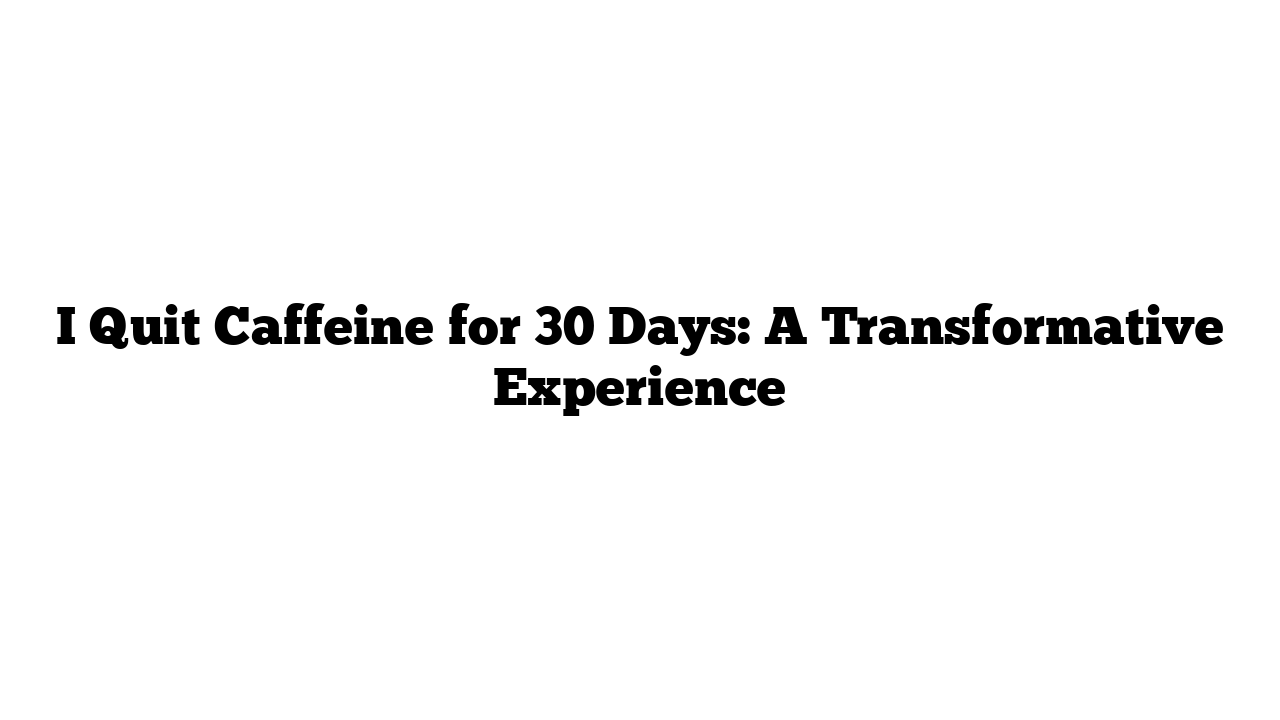Introduction to My Caffeine Journey
Caffeine is more than just a beverage; it’s a crucial part of many people’s daily rituals. For me, coffee was a beloved companion, fueling my days with energy and comfort. However, after realizing I was consuming up to six cups daily, I decided to embark on a 30-day caffeine-free challenge. What followed was an eye-opening journey that changed my life in ways I never expected.
The Dark Side of Caffeine
Caffeine, the world’s most widely consumed psychoactive substance, has its benefits, but it also has a flip side. Relying on this morning elixir can lead to a roller coaster of energy highs and lows, impacting everything from sleep quality to stress levels. Understanding caffeine’s effects is crucial for those of us who enjoy our morning brew.
How Caffeine Affects Our Brain
Caffeine mimics a neurotransmitter called adenosine, which signals the body to wind down. When we consume caffeine, it competes with adenosine, blocking its receptors. This leads to increased neuronal activity and prompts the release of other neurotransmitters like dopamine and norepinephrine. The result? A boost in mood and energy—but at a cost.
Over time, our bodies adapt, requiring more caffeine to achieve the same effects. This cycle creates reliance, leading to increased stress and anxiety. My curiosity about caffeine’s impact fueled my desire to quit. How would my body react when I eliminated it entirely from my routine?
The Challenge Begins
When I began my 30-day challenge, my motivation was high. I was determined to resist all forms of caffeine, including decaffeinated beverages, to break the habit completely. I aimed to truly understand my baseline without the psychological comfort of a morning coffee.
The Initial Days: Struggle and Withdrawal
The first day was relatively easy, filled with excitement and novelty. However, as I progressed, withdrawal symptoms kicked in. I experienced intense headaches and fatigue, leading to moments of despair. My productivity plummeted, and I struggled to cope with everyday challenges, feeling like a shell of my former self.
Why was this so hard? My brain’s reward system had become dependent on caffeine, and without it, I felt lost. Habits formed through repetition became automatic, and I faced cognitive dissonance—my desire to quit clashing with the comfort of my daily ritual.
Navigating Social Influences
Social factors also played a significant role in my challenge. My environment and the people around me often triggered cravings for caffeine. I decided to let my friends and family know about my journey, seeking their support rather than tempting offers for coffee. This step proved vital in maintaining my commitment.
I also reached out to my newsletter subscribers for accountability, creating a support network that kept me motivated. I learned that relying solely on willpower and motivation is not enough; a holistic approach is essential for overcoming dependence.
Progress Over Time
The first week and a half were rough. Headaches, mood swings, and concentration issues made me less enjoyable to be around. However, I began to notice improvements around the two-week mark. My headaches subsided, and I regained focus without the crutch of caffeine.
A New Sense of Clarity
As the days passed, resisting the urge for coffee became easier. I found my energy levels stabilized throughout the day, without the usual afternoon slump. Not only that, but my sleep quality significantly improved.
Insights Gained from My Challenge
This 30-day caffeine challenge taught me valuable lessons about addiction and personal growth. I realized that changing an addictive behavior involves addressing biological, psychological, and social factors. It’s not just about breaking a habit; it’s about understanding oneself.
If you’re considering a similar challenge, remember that it’s not merely about giving up a substance. It’s a journey toward building a healthier, more mindful life.
What’s Next for Me?
After 30 days, I’ve reintroduced coffee into my routine but with newfound mindfulness. I enjoy decaffeinated coffee and limit myself to one caffeinated drink every other day. This experience has made me more aware of my caffeine intake, and I feel empowered by my journey.
Share Your Story
Have you ever considered taking a break from caffeine or any other habit? Your experiences are valuable. Feel free to share your story in the comments below!
For more insights and health-related content, visit medicaltimes.io.
References
- Clear, J. (2018). Atomic Habits: An Easy & Proven Way to Build Good Habits & Break Bad Ones.
- Harvard Health Publishing. (2020). The Health Effects of Caffeine.
- National Institutes of Health. (2021). Caffeine: Effects on Health.
